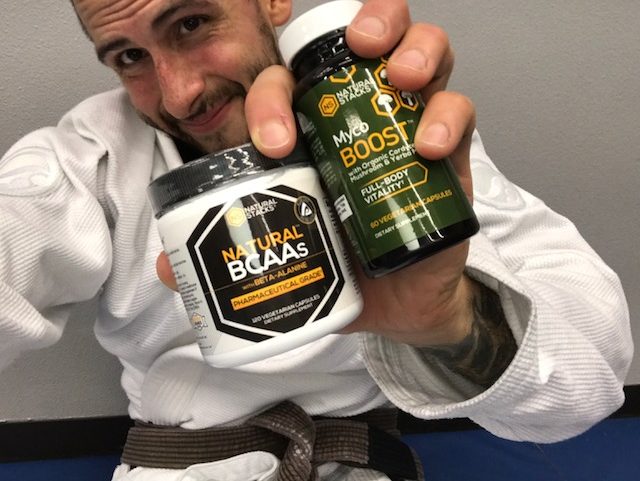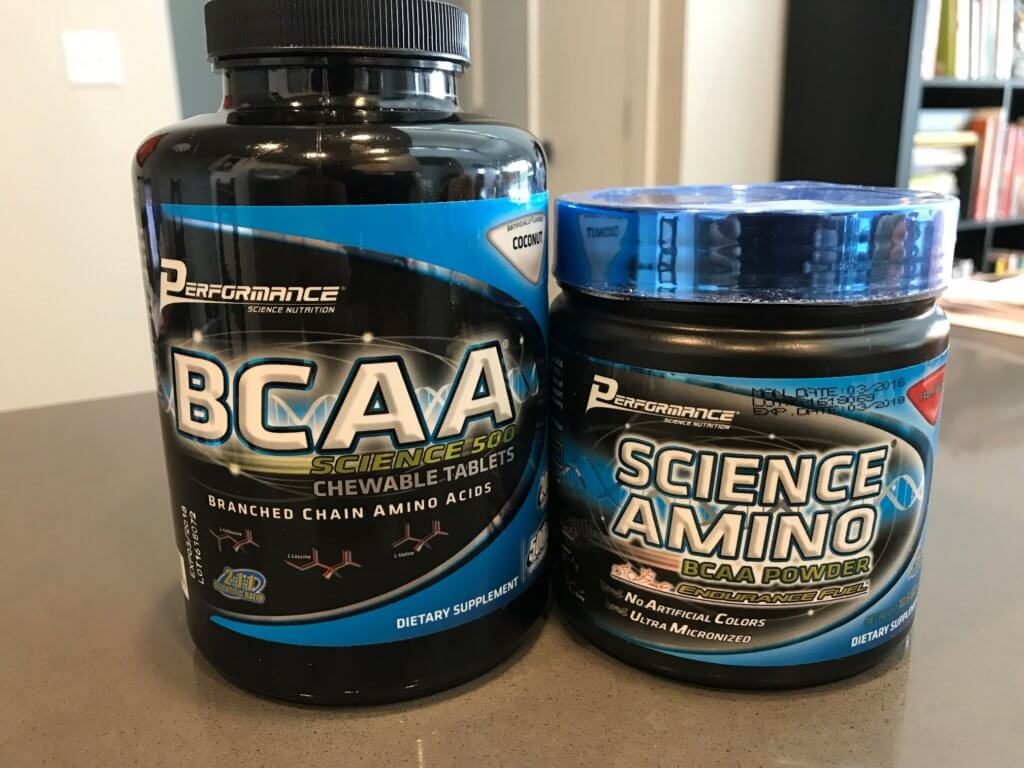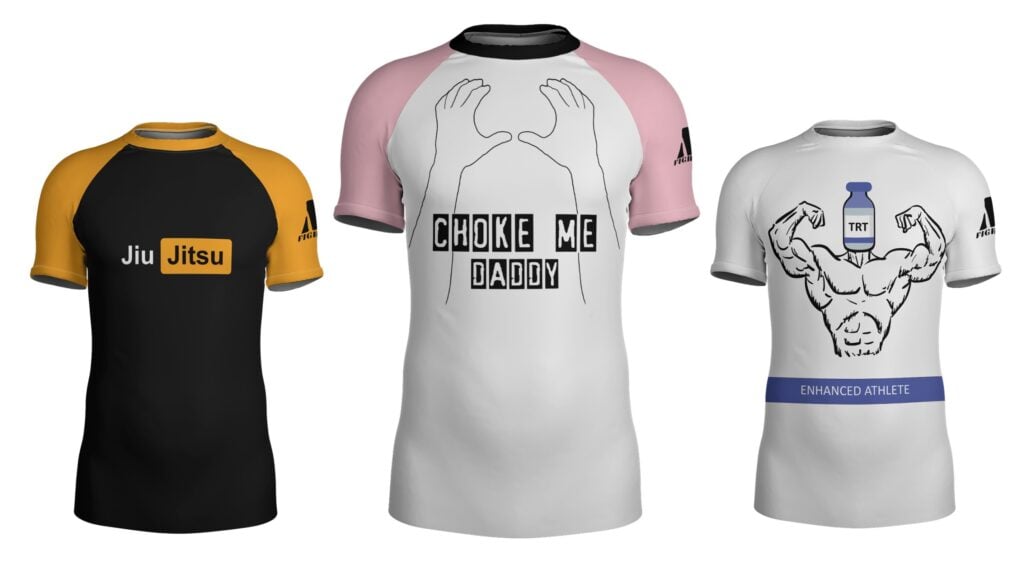
Using supplements to improve performance, health and nutrition are a given in the sports world nowadays. Grapplers and MMA fighters usually take supplementation for granted. They also follow the “more is better rule” which is never a good idea in any context. Supplements for Jiu-Jitsu are helpful, but only when you’re using the right ones in the correct way. otherwise, you’re just ending up with the most expensive urine ever, in a best-case scenario. Despite their best marketing efforts, supplement companies actually offer only a few products that truly work. One of those products is BCAA or Branched Chain Amino Acids.
Even amongst bodybuilders who are the know-it-alls when it comes to supplements, BCAA use is often a mystery. Not that any of them would admit it. For grapplers, who only pay attention as to what to buy, it’s even worse. Most of the time if you ask people what BCAAs do you’ll get a few different answers, most likely none of them correct. Does it help with recovery, conditioning, or muscle building? How about strength? And there’s the always burning question of how much to take and when. Of all the Jiu-Jitsu supplements that work, BCAAs are the most misunderstood ones.
The lowdown on Jiu-Jitsu supplements is simple. First of all, they’re not essential but do help significantly. Second, there are only a few that work and even a few that are good for BJJ. In our supplements series, we’ll try to go over those that actually have a positive effect fro grapplers. Today we’ll focus on BCAAs. IF you’re looking for a highly scientific article as to what exactly they can do, this is the wrong piece for you. We’ll keep it simple and easy, explaining what they are, how to take them, and how they can help your Jiu-Jitsu.
What Are BCAAs?
BCAA stands for Branched Chain Amino Acids. More specifically they are just three amino acids, that work together in a very specific ratio. But before going deeper into it let’s jsut explain what amino acids are. Amino acids are the smallest building blocks of proteins. They work both when taken in protein form and on their own. With BCAAs it’s the ratio of very specific amino acids that result in positive metabolic effects fro athletes.
The three building blocks of any BCAA supplement are amino acids leucine, isoleucine, and valine. All three are essential amino acids, that we should be getting from food anyway. Best sources include eggs, red meat, fish, beans, peas, and mushrooms. Th reason BCAAs work as a supplement is because the liver does not affect them after ingestion. This means that they end up in the bloodstream unchanged, and can get to work in your muscles straight away.
In terms of effects, BCAA’s primarily help increase protein synthesis. They also have a role to play in overall energy production and reduced protein degradation. These are all important benefits for all kinds of athletes, especially grapplers. So far, plenty of scientific studies has proven that BCAAs work. Given their relatively cheap price, they are certainly among the indispensable Jiu-Jitsu supplements.
BCAAs As Jiu-Jitsu Supplements

The increase in energy that people describe as a result of using BCAAs is due to their positive protein synthesis effects. Since they both help protein synthesis and prevent degradation of muscle tissue they’re the perfect supplement to help prevent muscle loss during extreme physical exertion.
Performance-wise, BCAAs work to replenish the amino acids that our bodies use during training. Constant replenishment of BCAAs results in less fatigue and better overall endurance. Since protein synthesis means building new tissue, this translates as rebuilding teh tissue your body breaks down during physical activities almost instantly.
Amino acids are also a direct source of energy. When your body depletes your glycogen stores, BCAAs provide a boost of energy in the absence of glucose. The resulting increased energy output also means you’re able to go harder, for longer.
As an added bonus BCAAs also help boost immune function. Furthermore, they help reduce fatigue at a central level, thus boosting your recovery capabilities.
Dosage And Timing
The biggest trouble with most Jiu-Jitsu supplements is missing out on the correct dosage and timing of ingestion. There’s a time and a dose for each supplement and BCAAs are no different. Actually, they’ll offer as much variety as any supplement, since you can take them before, during, and/or after a workout.

Taking BCAA Jiu-Jitsu supplements is never wrong. However, there are certain periods of your training day that are crucial in order to get the most benefits. For Jiu-Jitsu athletes, the best time to take them is right before, and/or during training. Taking them during training can prove a bit hard because most people are usually trying to catch their breath between rounds. Running off to your shaker bottle after every roll is just a nuisance. So, getting all your amino acids in right before class starts is the best bet. You could also get another dose post-workout, allowing BCAAs to kick-start your recovery right away.
Benefits Of Drinking Coffee And Green Tea For Jiu-Jitsu Training


![Darce Choke Encyclopedia – Origins, Mechanics and Variations [2025] BJJ, choke, Brabo, BJJ Darce Choke, D'arce Choke, Darce BJJ Choke](https://bjj-world.com/wp-content/uploads/2017/11/JungPoirierLeeYahoo-218x150.jpg)









![X-Guard Trickery Kyle Sleeman DVD Review [2025] X-Guard Trickery Kyle Sleeman DVD Review](https://bjj-world.com/wp-content/uploads/2025/03/x-guard-trickery-kyle-sleeman-dvd-review-218x150.png)
![Countering with Crab Ride Anthony Budion DVD Review [2025] Countering with Crab Ride Anthony Budion DVD Review](https://bjj-world.com/wp-content/uploads/2025/03/countering-with-crab-ride-anthony-budion-dvd-review-218x150.png)
![Closet Closed Guard Craig Jones DVD Review [2025] Closet Closed Guard Craig Jones DVD Review](https://bjj-world.com/wp-content/uploads/2025/03/closet-closed-guard-craig-jones-dvd-review-218x150.png)
![Xanadu Back Takes Levi Jones-Leary DVD Review [2025] Xanadu Back Takes Levi Jones-Leary DVD Review](https://bjj-world.com/wp-content/uploads/2025/03/xanadu-back-takes-levi-jones-leary-dvd-review-218x150.png)

![No-Gi Grapplers Guide To Front Headlock Joel Bane DVD Review [2025] No-Gi Grapplers Guide To Front Headlock Joel Bane DVD Review](https://bjj-world.com/wp-content/uploads/2025/03/no-gi-front-headlock-joel-bane-dvd-review-218x150.png)
![Breaking Their Guard Mikey Musumeci DVD Review [2025] Breaking Their Guard Mikey Musumeci DVD Review](https://bjj-world.com/wp-content/uploads/2025/02/breaking-their-guard-mikey-musumeci-dvd-review-324x235.png)

![Leg Lock Strategies: Navigating Entanglements Jack Stapleton DVD Review [2024] Leg Lock Strategies: Navigating Entanglements Jack Stapleton DVD Review](https://bjj-world.com/wp-content/uploads/2024/12/navigating-entanglements-jack-stapleton-dvd-review-100x70.png)

![Unpinnable Mount Escape Mastery Haleem Syed DVD Review [2025] Mount Escape Mastery Haleem Syed DVD Review](https://bjj-world.com/wp-content/uploads/2025/01/mount-escape-mastery-haleem-syed-dvd-review-100x70.png)
![Crossing and Spinning Steps To Attack Israel Hernandez DVD Review [2024] Crossing and Spinning Steps To Attack Israel Hernandez DVD Review](https://bjj-world.com/wp-content/uploads/2024/09/spinning-steps-to-attack-israel-hernandez-dvd-review-100x70.png)

![Neil Melanson DVD Bundle Review: Filthy Brutal No Good Attacks [2024] Neil Melanson DVD Bundle Review: Filthy Brutal No Good Attacks](https://bjj-world.com/wp-content/uploads/2024/10/neil-melanson-dvd-bundle-review-filthy-attacks-100x70.png)

![Modern Split Squat Passing Jason Rau DVD Review [2024] Modern Split Squat Passing Jason Rau DVD Review](https://bjj-world.com/wp-content/uploads/2024/11/modern-split-squat-passing-jason-rau-dvd-review-100x70.png)

![Higher Tripod Passing Craig Jones DVD Review [2025] Higher Tripod Passing Craig Jones DVD Review](https://bjj-world.com/wp-content/uploads/2025/02/higher-tripod-passing-craig-jones-dvd-review-100x70.png)



![Master The Move The American Lock John Danaher DVD Review [2024] Master The Move The American Lock John Danaher DVD Review](https://bjj-world.com/wp-content/uploads/2024/12/the-american-lock-john-danaher-dvd-review-100x70.png)

![Master Scissor Sweep Ryan Scialoia DVD Review [2025] Master Scissor Sweep Ryan Scialoia DVD Review](https://bjj-world.com/wp-content/uploads/2024/12/scissor-sweep-ryan-scialoia-dvd-review-100x70.png)

![Efficiently Executing X-Guard Giancarlo Bodoni DVD Review [2024] Efficiently Executing X-Guard Giancarlo Bodoni DVD Review](https://bjj-world.com/wp-content/uploads/2024/09/efficiently-executing-x-guard-giancarlo-bodoni-dvd-REVIEW-100x70.png)
![Leg Locks From Beginner To Advanced Dan Manasoiu DVD Review [2024] Leg Locks From Beginner To Advanced Dan Manasoiu DVD Review](https://bjj-world.com/wp-content/uploads/2024/12/leg-locks-from-beginner-to-advanced-dan-manasoiu-dvd-review-100x70.png)
![Mastering The Crucifix Alexandre Pereira DVD Review [2025] Mastering The Crucifix Alexandre Pereira DVD Review](https://bjj-world.com/wp-content/uploads/2025/01/mastering-the-crucifix-alexandre-pereira-dvd-review-100x70.png)
![The Rack Kyle Watson BJJ DVD Review [2025] The Rack Kyle Watson BJJ DVD Review](https://bjj-world.com/wp-content/uploads/2024/12/the-rack-kyle-watson-bjj-dvd-review-100x70.png)

![Master The Move Anaconda Strangle John Danaher DVD Review [2025] Master The Move Anaconda Strangle John Danaher DVD Review](https://bjj-world.com/wp-content/uploads/2025/02/anaconda-strangle-john-danaher-dvd-review-100x70.png)

![Roger Gracie Closed Guard System DVD Review [2025] Roger Gracie Closed Guard System DVD Review](https://bjj-world.com/wp-content/uploads/2025/01/roger-gracie-closed-guard-system-dvd-review-100x70.png)

![Special K Guard Neil Melanson DVD Review [2025] Special K Guard Neil Melanson DVD Review](https://bjj-world.com/wp-content/uploads/2025/03/special-k-guard-neil-melanson-dvd-review-100x70.png)